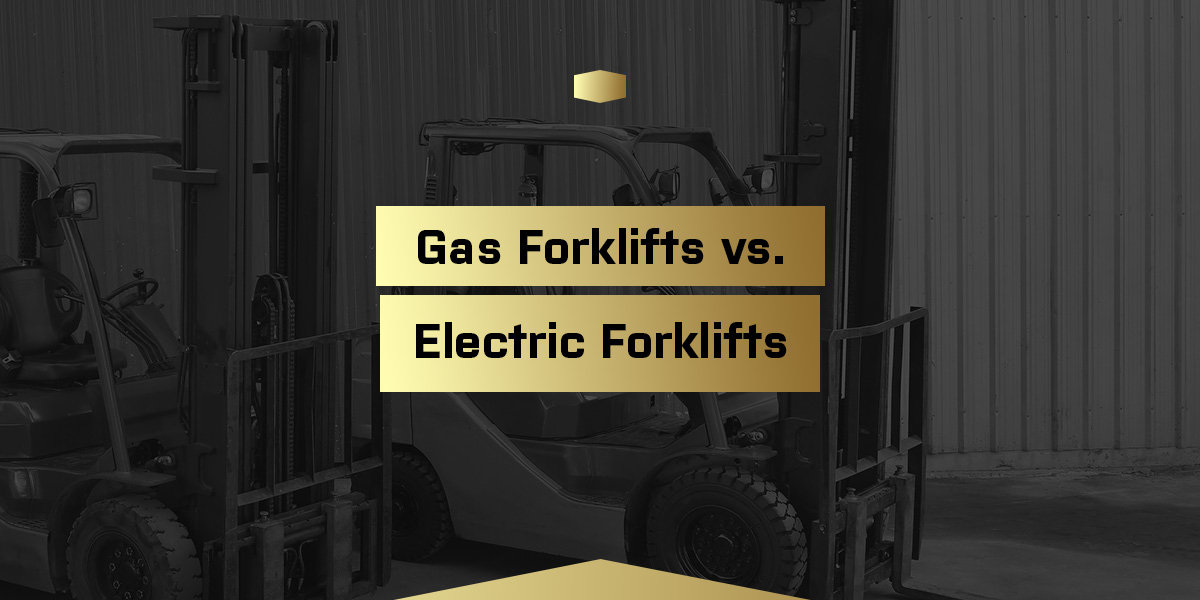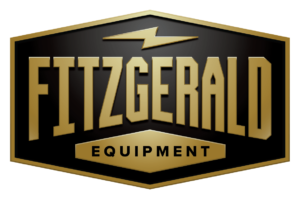
Electric and gas forklifts have distinct advantages that make them a valuable investment. The right option for you ultimately comes down to your work environment, existing facility and project needs and priorities.
Electric Forklifts
Electric forklifts are common in warehouse settings and similar indoor workplaces. They typically have smaller frames than gas ones, which makes them easier to maneuver around tighter turns and corners. Most are also rated for outside use, but not all. Be sure to check the model’s internal protection rating to determine the best operational environment.
Efficiency
Electric forklifts don’t have engines — instead, they run on a charged lead-acid or lithium-ion battery. While they do need fluid to perform hydraulic functions like clamping and shifting, they have fewer moving parts than gas-powered models. That translates to fewer parts replacements and simpler preventive maintenance. The main upkeep tasks are inspecting the wiring and charging terminals and keeping the battery free of buildup.
However, battery operation also means you have to wait for the battery to recharge and cool down after each use.
While new electric forklifts are usually a higher investment upfront, many find the benefits worth the extra expense. The most significant cost after purchasing the equipment is making upgrades to your facility if it’s not currently equipped to handle the battery’s voltage requirements.
Environmental
When heavy equipment engines burn through gasoline, they emit several toxins that harm the environment by contributing to air pollution. These include:
- Carbon monoxide
- Nitrogen oxides
- Unburned hydrocarbons
- Debris and particulate matter
- Carbon dioxide
Electric forklifts are significantly better for the environment than gas-powered models, so much so that some state policies are beginning to reflect the benefits of a zero-emission fleet. Equipment manufacturers and sellers in California will no longer be permitted to produce or sell Class IV and Class V forklifts that use large-spark ignition. This includes all gas, natural gas, and propane forklifts. Officials estimate that this change will prevent over 2 tons of harmful emissions from entering the atmosphere by 2031.
Safety
Electric forklifts don’t generate exhaust fumes, which are dangerous for workers if operating in a poorly ventilated area. They’re also quieter and vibrate less while in use, which may help cut down on operator discomfort and fatigue. The lack of a gas tank also creates a less obstructed view for the operator, reducing the chance of visibility-related incidents.
That said, batteries are not without their risks. They get extremely hot, which can cause serious burns if not handled correctly. There’s also the chance of electric shock if the battery or its charging terminal isn’t installed correctly or is mishandled. Safety training is essential to avoid these dangers.
Gas Forklifts
Gas forklifts run on either gasoline, diesel or liquid propane. Many choose them because they’ve been around longer than electric and are a time-tested, reliable option that longtime operators already feel comfortable with. Most gas forklifts have a higher capacity than electric ones, which may make them a better option for uneven or hilly terrain.
Efficiency
These forklifts run on an internal combustion engine (ICE) that requires regular fuel replenishment. While it’s simpler and faster to refill a gas tank than to recharge an electric battery, unpredictable fuel costs make it difficult to maintain an accurate budget forecast. Gas engines can also take a few minutes to warm up in cold weather. New gas forklifts are typically less expensive upfront, but the cost of fuel often makes it more expensive to own in the long run.
Because gas forklifts have been around longer, you’re less likely to need any facility changes to accommodate your fleet. Most experienced operators are already familiar with how to use the equipment, so you won’t need to implement any extra training like you may need to do with an electric fleet.
Environmental
Electric forklifts are always going to be a more environmentally friendly option than gas models, as anything that uses an ICE will generate emissions. If you want a more eco-conscious gas model, propane burns cleaner than gasoline or diesel because of its lower carbon content. Avoid investing in a heavy-duty forklift unless necessary — more power equates to more burned fuel.
Safety
Exposure to fuel emissions is bad for human health. Short-term side effects can include cardiac problems, asthma and reduced lung function, while long-term exposure has been linked to chronic diseases and cancer. Gas forklifts should only be operated indoors if it’s a well-ventilated area that meets the Occupational Safety and Health Administration (OSHA)’s standards for indoor use.
Leaking or punctured fuel tanks, whether in storage or on the forklift itself, are also a fire hazard. Be sure to implement stringent safety and inspection practices to mitigate these risks.
What to Consider During Your Forklift Comparison
To choose the right equipment for your needs, consider the following:
Typical Worksite
Before you begin comparing models, you need to assess your current or most typical worksite:
- If operating your forklift indoors, an electric forklift may be a safer option because it’s emissions-free and operates more quietly. Only use a gas-powered forklift indoors if the area is well ventilated, and be sure to comply with OSHA’s guidelines for powered industrial trucks.
- If operating your forklift outdoors, either option is suitable. Sites with uneven or hilly terrain may require a higher-capacity machine with more torque power, like those that run on diesel.
If you take your equipment to various kinds of worksites, consider a compact model that transports more easily.
Existing Infrastructure
Electric forklift batteries must have adequate voltage and a stable charging area. Consult an electrician to determine what changes your facility may require, if any, to support the charging output.
Consider where you’ll store your forklift. The best way to ensure longevity for all heavy equipment is to protect it from the elements when not in use — however, electric machines are particularly vulnerable to water-related damage if certain parts are exposed.
Average Workload
If you will use the forklift regularly and often, choose one that can keep up with that demand. Electric models generally don’t last as long as gas-powered machines before the battery needs to be recharged.
Gas equipment is easier to refuel as long as you accurately estimate your daily fuel expenditures and get regular fuel delivery to stay operational. Don’t over-order unless you have a safe, environmentally controlled place to store it. Even then, be careful not to let extra fuel sit too long, as it could expire.
Maintenance Requirements
ICEs have more moving parts, which means gas forklifts require more upkeep and replacements to keep each component performing at its best. Regular preventive maintenance is essential to catch small issues before they lead to engine failure and a costly replacement. You’ll also need to lubricate parts frequently to minimize metal-on-metal grinding that causes premature deterioration.
Electric forklifts need far less maintenance, but you’ll still want to inspect wiring and hydraulic parts often to make repairs as needed.
Initial and Long-Term Costs
Initial costs depend on whether you buy or rent a new or used machine and any infrastructure changes you’ll need to make to accommodate the forklift at your warehouse or worksite. Long-term expenses include:
- Fuel or electricity
- Preventive maintenance
- Parts replacements or upgrades
- Operational downtime between charges or tank refills
- Updated training programs to operate new machinery
Consider using an online cost calculator to aid in your forklift comparison.
Trust Fitzgerald Equipment Company for Your Next Forklift
If you’re in the market for a forklift, Fitzgerald Equipment Company can help. We carry a range of heavy equipment and parts so you can outfit and optimize your fleet. We know flexibility matters, and no two businesses are alike — that’s why we offer gas and electric forklift rentals as well as new and used models for purchase. Check out our online catalog to learn more.




